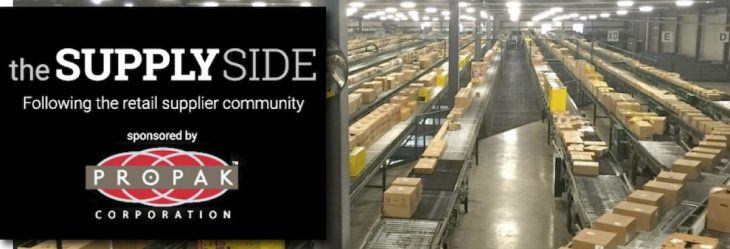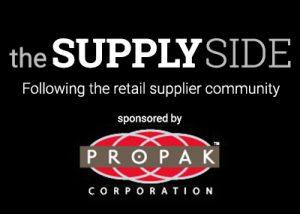The Supply Side: Wal-Mart pushes for better quality private label products
by June 19, 2017 11:46 am 1,613 views

Walmart U.S. Chief Merchandising Officer Steve Bratspies said the retailer is passionate about offering a wide assortment of private label products and investing in quality. It’s a message closely parsed by suppliers — branded and otherwise.
“I like to tell people you are never really quite there in terms of quality, because there is always more work to do, and we at Wal-Mart are constantly doing just that,” Bratspies said recently.
Wal-Mart said private label plays an important role in its merchandise offerings in the U.S. and abroad. Greg Foran, CEO of Walmart U.S., said the retailer is making good progress on private label in food, where using the new Culinary Innovation Center in Bentonville has been helpful. He said private label “is an important part of the mix if you look at what’s happening in the marketplace.”
David Cheesewright, CEO of Walmart International, said private label has good momentum in all the retailer’s markets across the globe. He said at ASDA, the grocery chain in the United Kingdom, private label accounts for about 47% of the total sales. He said by “leveraging the strength of private label relationships around the world, Walmart U.S. can benefit, whether that’s sourcing raw materials or consolidating our supplier base for things like creating meal kits for the U.S. business.”
GENERAL MERCHANDISE
Wal-Mart offers private and proprietary brands across 21 business units in general merchandise. Karen Stuckey, senior vice president of private brands at Wal-Mart, said that includes everything from tools to toasters to tank tops to towels to toys and everything in between. Wal-Mart price matters but private brands that deliver on value but fail on quality will not succeed with today’s savvy shoppers, Stuckey said.
Price is “table stakes” for private label, and that’s why the retailer says it’s focused on removing unnecessary costs and inefficiencies from the supply chain. Wal-Mart said consistency in quality has to be there every time a consumer purchases a Wal-Mart private label product.

Q — Quality
U — Unique or differentiated
E — Experience; easy to assemble, easy directions
S — Style relevance within the category
T — Technology used to the fullest
Wal-Mart said it tests for performance, so items meet customers’ expectations and pass regulatory muster. Wal-Mart also tests for esthetics, so if a consumer buys a blue towel in Arkansas, it looks the same as one they would buy in New York or California.
LOCAL TESTING WITH CTL
Consumer Testing Laboratories Inc. (CTL) is a partner with Wal-Mart in its 14 testing centers around the globe. There are two CTL centers in Northwest Arkansas. Textiles are tested in Bentonville, and hardline products such as toasters are tested in Rogers. Wal-Mart said it tests more than 200,000 times a year, and if there is customer feedback that brings a quality issue to light the retailer will test it again.
Three brands which are tested locally by CTL and Wal-Mart include Ozark Trails tents; Athletic Works, an at-leisure brand at Wal-Mart, as well as the Mainstay private label bath towels.
The Ozark Trails tents are tested for water resistance and fade resistance. The tent was shown to have withstood up to 50-mile an hour winds and torrential rains. Wal-Mart said the tests are done just as the customer uses the product. For instance, the tent is assembled and subjected to wind, water and sun conditions before it can be deemed ready for sale.
If there is an issue with a product’s reliability, more tests are done, and the product could be revamped, like the Mainstay Patio Sun Umbrella. The umbrella didn’t meet customer expectations for wind resistance and fading. Over the past year the product has been re-vamped. Two extra feet in circumference were added to the umbrella as were added supports to the structure. Wal-Mart said the price stayed the same even though it was made bigger and stronger.
Ken Lanshe, an engineer by trade, supervises apparel technical services and softlines at Walmart U.S. He said the Athletic Works products face 15 to 20 tests, depending on the claims involved. For instance, if the product says it will absorb sweat, then that claim is tested.
“We ship millions of products to stores around the world, and we want to make sure the experience the customer has with that product meets their expectation,” Lanshe said. “One test is a compliance test to ensure the product meets the claims.”
AN EXAMPLE: TOWEL TESTING
He said the test of the “fast drying” claim involves cutting the apparel fabric into strips and dipping into water, then watching and timing the speed at which that water wicks up the fabric. Lanshe said given the size of the sample, the wicking is measured for 30 minutes. From that it’s easy to see which products outperform others. He said products can be enhanced after this type of testing if they don’t meet the “fast drying criteria.” Lanshe also said the items are tested for durability, with the fabric being rolled around a drum and spun at high speeds for 600 rotations to measure snagging.
Wal-Mart also presented a demonstration of its Mainstay bath towel, the lowest price point in the retailer’s towel offerings. Scott Simpson, director of technical services of general merchandise/ seasonal, said these towels undergo about 30 tests for quality to ensure the product performs up to standards. The towels are put through an absorbency test where water is poured through the towel with the water weeping amounts measured as well. Simpson said the standard performance is 50% absorbency. For a product to claim extra-or ultra-absorbency it would have to surpass 70% of the water passing through it. The Mainstay towel tested with more than 80% absorbency.
The towel is also tested for color fastness by being washed repeatedly. The Mainstay towel was also tested for its quick drying claim. Simpson said washing the towel using industry standard metrics, the towel dried 15 minutes faster than a normal towel. He said lint is collected in the dryer to test how much each towel loses in five dryings. The average towel produced three times more lint than the lower-priced Mainstay item Wal-Mart sells.
–––––––––––––––––––
Editor’s note: The Supply Side section of Talk Business & Politics focuses on the companies, organizations, issues and individuals engaged in providing products and services to retailers. The Supply Side is managed by Talk Business & Politics and sponsored by Propak Logistics.
